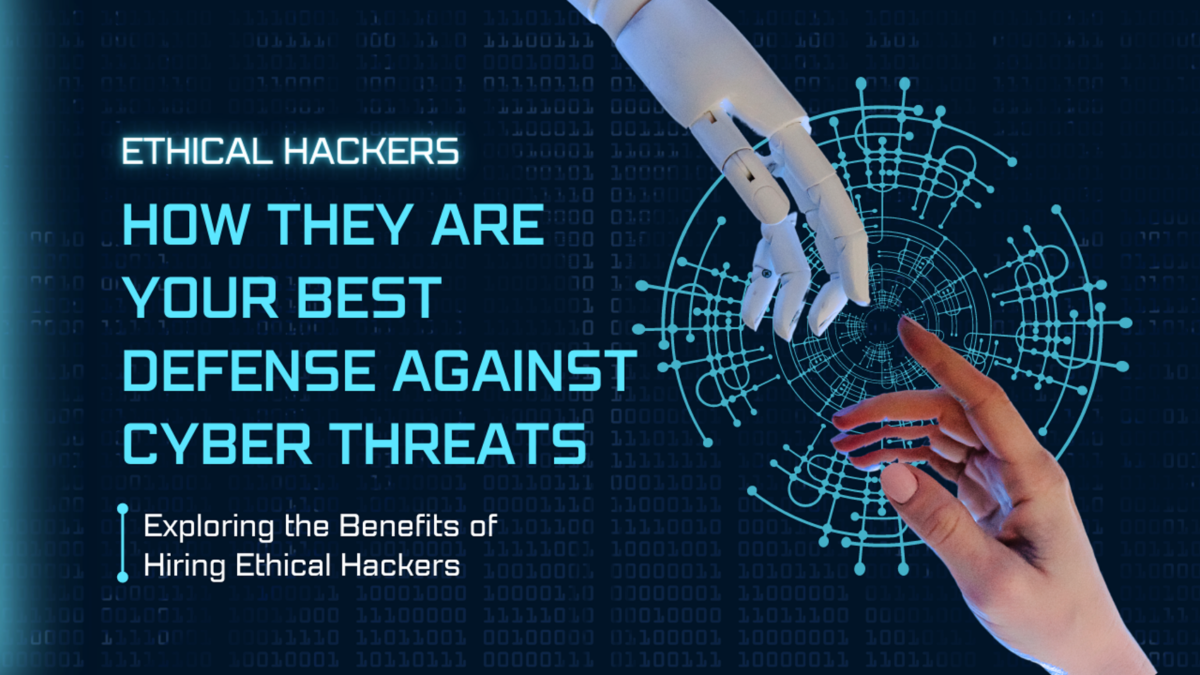
Why You Should Consider Ethical Hacking Services
August 4, 2022
Searching For Professional Hackers? Here Are the 10 Questions You Need to Ask
July 19, 2023So your business is finally up and running, and you’ve invested years of blood, sweat and tears (and cash) into getting it off the ground. The last thing you want is for some hacker to break in and steal your data or shut you down. The truth is, cybercrime is big business these days and hackers are constantly looking for new targets.
Don’t panic just yet though. The good news is there are cybersecurity experts called ethical hackers who can help. Ethical hackers are hackers themselves, but they use their skills for good instead of evil. They work to find vulnerabilities in systems and networks before the bad guys do.
By hiring an ethical hacker, you get a hacker’s perspective on how to strengthen your cyber defenses. They’ll probe your systems, find the weak spots, and help you patch them up before a real hacker can exploit them.
Cyber threats are real, but with the right defense – an ethical hacker – on your side, you can rest easier knowing your business’s data and operations are secure.
What Do Ethical Hackers Do?
Ethical hackers, also known as “white hat” hackers, are cybersecurity professionals who help protect organizations by finding and reporting vulnerabilities in their digital systems before malicious hackers can exploit them.
What exactly do ethical hackers do? Their main job is to hack into a company’s network and uncover weaknesses that could be targeted. But unlike malicious “black hat” hackers, they do this legally and ethically, with the company’s permission.
Ethical hackers typically start by gathering information about the target system and network. They look for potential vulnerabilities like unpatched software, insecure system configurations, and weak or default passwords.
Once they find vulnerabilities, ethical hackers work to exploit them to gain access, just like a real hacker would. However, instead of stealing data or installing malware, they document the issues and provide solutions to fix them.
Fixing vulnerabilities usually involves:
- Updating and patching outdated software programs.
- Changing default or weak account passwords and settings.
- Improving network security configurations and firewall rules.
- Educating employees about security best practices.
By taking a proactive approach to cybersecurity and fixing vulnerabilities before they can be exploited, ethical hackers help prevent data breaches, service disruptions, and other costly cyber attacks. They play an essential role in protecting businesses and their customers in today’s digital world.
Why Ethical Hacking Is Important for Businesses
If you run a business today, cyber threats should be at the top of your worry list. Hackers are constantly trying to access your systems and data, and if they succeed, it can cost you big time. That’s why hiring ethical hackers is so important.
Ethical hackers, also known as “white hat” hackers, use the same tools and techniques as malicious hackers to test your cyber defenses. By finding vulnerabilities first, they help you fix them before the bad actors exploit them. Some of the ways they help include:
- Testing your networks and web applications for weaknesses. Ethical hackers probe for holes in your security that could let hackers break in. Once found, they tell you how to patch them up tight.
- Phishing your employees to make them aware of malicious scams. Ethical hackers send fake phishing emails to see who takes the bait, then coach those folks on spotting real phishing attempts before they become victims.
- Detecting malware that may be lurking in your systems. Ethical hackers scan for malicious software that could steal data or hold your company hostage until a ransom is paid. They eradicate it before it causes harm.
In today’s digital world, cyber threats are real and constant. But with the help of ethical hackers working for you, you can rest assured your data, networks, and systems are as secure as possible. Their goal is to protect you from cyber threats you may not even know exist yet – and that level of vigilance and expertise is well worth the investment.
So don’t wait until you’re attacked – bring in the ethical hackers and let them help safeguard your company’s security and future. It may just be the smartest business decision you make all year.
Common Types of Ethical Hacking Services
Ethical hackers provide several types of services to help improve your cyber defenses.
Penetration Testing
Penetration testing, also known as pen testing, involves ethical hackers attempting to breach your systems to uncover vulnerabilities before malicious hackers can exploit them. Pen testers may use techniques like social engineering, scanning for open ports, analyzing source code for flaws, and brute force attacks to gain access. Once inside, they document vulnerabilities and provide recommendations to patch them up. Regular pen testing is critical for finding weaknesses in your network and applications before cybercriminals do.
Vulnerability Assessments
Vulnerability assessments take a high-level look at your IT infrastructure to detect weaknesses that could potentially be exploited. Ethical hackers will scan your networks and systems to uncover vulnerabilities like unpatched software, misconfigured security settings, and outdated firewall rules. They provide an overall vulnerability report highlighting areas of risk so you can address them promptly. Vulnerability assessments are a proactive way to strengthen your security posture.
Red Teaming
Red teaming involves simulating real-world cyber attacks to test how well your organization can detect and respond to threats. Ethical hackers will use advanced techniques to gain access to systems while evading security controls and monitoring tools. The goal is to infiltrate as far as possible into your infrastructure without getting caught. Red teaming helps evaluate the effectiveness of your defensive capabilities, staff response times, and processes for handling incidents. The results provide valuable insights into improving your cyber readiness.
Regular testing and assessments from ethical hackers are essential for protecting your business from cyber threats. Their services help ensure your data, systems, and infrastructure have robust security controls and monitoring in place for deterring malicious hackers. Staying on top of the latest vulnerabilities and attack techniques with help from ethical hackers is key to maintaining strong cyber defenses.
Penetration Testing: Simulating Real Cyber Attacks
Penetration testing, also known as ethical hacking, involves hiring cybersecurity professionals to simulate real cyber attacks on your business systems and networks to uncover vulnerabilities before malicious hackers can exploit them.
Find the Flaws Before the Bad Guys Do
Ethical hackers use the same tools and techniques as criminal hackers to find weaknesses in your digital defenses. By taking a “white hat” approach, they can uncover vulnerabilities in your systems and report them to you so you can fix them right away. Some of the common vulnerabilities they look for include:
- Unpatched software with known security issues
- Weak or default passwords
- SQL injection flaws in websites
- Outdated firewall rules
- Unencrypted sensitive data
Without penetration testing, you likely won’t know you have these vulnerabilities until an attacker uses them against you. Regular tests help ensure your systems are as secure as possible at all times.
Customized Testing for Your Unique Environment
Penetration testing is not a one-size-fits-all service. Ethical hacking firms will evaluate your specific infrastructure, applications, and business needs to develop a customized testing plan. They will determine the appropriate level of testing, from a basic network scan all the way up to a full-scale, multi-week “red team” exercise. The more in-depth the test, the more vulnerabilities will be uncovered.
Continuous Assessment for Constant Threats
Cyber threats are continuously evolving, so penetration testing should be performed regularly to catch new vulnerabilities that crop up over time. For most businesses, annual or bi-annual testing is recommended. Some highly regulated industries or businesses with valuable digital assets may require quarterly or even monthly testing. Continuous testing is the only way to keep up with the latest attack methods and secure your systems against the constant barrage of new threats.
In summary, penetration testing by ethical hackers is essential for proactively securing your business against cyber threats. Their simulated attacks can uncover vulnerabilities in your systems before the bad guys do, allowing you to fix them promptly and help ensure your infrastructure is as secure as possible at all times. Regular testing, customized to your unique environment and needs, is the only way to continuously assess for new weaknesses and keep up with evolving cyber threats.
Vulnerability Assessments: Identifying and Prioritizing Risks
Cybercriminals are constantly trying to hack into business systems to steal data, commit fraud or disrupt operations. As an ethical hacker, it’s your job to find vulnerabilities in systems and networks before the bad guys do. One of the most important services you provide is vulnerability assessments.
Vulnerability assessments, also known as penetration testing, involve legally and ethically hacking into systems to uncover weaknesses. You methodically scan networks, applications and systems to identify security risks like software flaws, configuration errors or outdated technology.
Once you discover vulnerabilities, you prioritize them based on the severity of the risk. High priority risks are those that could allow unauthorized access or lead to data breaches. These should be addressed immediately by systems administrators or security teams. Medium and low priority risks, while still problematic, do not necessarily require an instant fix but should not be ignored.
After assessments are complete, you provide detailed reports to stakeholders highlighting vulnerabilities found, how they can be exploited, and recommendations to remediate risks. Your reports help companies understand their security posture, where sensitive data may be exposed, and how to strengthen defenses. Prioritized lists of vulnerabilities allow security teams to tackle the biggest dangers first before moving on to lesser risks.
Ethical hackers play an integral role in cyber defense. By identifying weaknesses before cybercriminals can attack them, you help safeguard digital infrastructure, protect sensitive information and reduce the impact of data breaches. Vulnerability assessments are one of the most valuable services provided to strengthen security and minimize risks. Companies that regularly scan for and remediate vulnerabilities have a much lower chance of being successfully hacked.
You, as an ethical hacker, are essential for identifying and eliminating security risks. Vulnerability assessments are key to building robust cyber defenses and safeguarding businesses. By finding and fixing weaknesses, you help companies avoid becoming victims of cybercrime. Your skill and expertise provide an important line of defense against those who wish to do harm.
Social Engineering: The Human Side of Cybersecurity
Social engineering attacks target the human element in cybersecurity. Hackers try to manipulate people into divulging sensitive information or performing certain actions like clicking malicious links or downloading infected software. These types of attacks are often considered the weakest link in a company’s security.
As technology has advanced, social engineering techniques have become incredibly sophisticated. Hackers employ psychological tactics like authority, social proof, and urgency to coerce victims without raising suspicion. They impersonate trusted companies and contacts, create highly believable phishing emails, and leverage people’s natural instincts and desire to be helpful against them.
Despite major investments in cybersecurity technology, social engineering attacks remain prevalent and successful. According to a 2020 Data Breach Investigations Report, over 67% of breaches involved phishing and over 80% of those were followed by software installation. The harsh truth is that as long as there are people involved, there will be opportunities for manipulation and deception.
How Ethical Hackers Help
Ethical hackers, also known as “white hat” hackers, use their skills to strengthen a company’s human-centric security measures. They run realistic social engineering simulations to identify weaknesses, test employee responses, and make recommendations for improvement. These controlled attacks have been shown to significantly reduce vulnerability over time through education and awareness.
Some of the ways ethical hackers help include:
- Performing phishing email tests to see who clicks malicious links or provides sensitive data. This reveals employees who need further training.
- Conducting vishing (voice phishing) calls to mimic fraudsters trying to steal information or install ransomware. This tests how call center staff handle such situations.
- Carrying out physical intrusion attempts to access sensitive areas and information. This exposes any gaps in building access controls and policies.
- Providing detailed reports on the findings and suggested strategies to bolster security awareness and better protect against threats. Ongoing assessments help ensure continued progress.
While technology has a role to play, people are the true defenders against social engineering. Ethical hackers are instrumental in helping organizations understand and address the human vulnerabilities that hackers exploit. With vigilance and education, staff can be transformed from potential targets into a strong line of defense.
Regular Audits Are Critical: Don’t Just Set It and Forget It
Regular security audits of your systems and networks are absolutely critical to stay ahead of cyber threats. As technology rapidly advances, so do the techniques hackers use to gain access. Don’t make the mistake of setting up security measures once and assuming you’re done. Cybersecurity requires constant vigilance and updating.
Performing regular ethical hacking audits on your own systems is one of the best ways to identify vulnerabilities before malicious hackers do. Ethical hackers use the same tools and techniques as criminal hackers to probe for weaknesses but then report them to you so you can patch the holes. Think of ethical hackers as your team’s offense, trying their best to get in, while your cybersecurity team plays defense to keep them out. This proactive approach can uncover risks you didn’t even know you had.
Some of the key areas ethical hackers will target include:
- Your network infrastructure – Checking for outdated firmware, default passwords, and other weaknesses in routers, switches, and firewalls.
- Public-facing web applications – Scanning for vulnerabilities like SQL injections, cross-site scripting, and other exploits in any web apps, email forms, or login portals.
- Public-facing web applications – Scanning for vulnerabilities like SQL injections, cross-site scripting, and other exploits in any web apps, email forms, or login portals.
- Public-facing web applications – Scanning for vulnerabilities like SQL injections, cross-site scripting, and other exploits in any web apps, email forms, or login portals.
- Employee systems and accounts – Testing for weak or reused passwords, lack of multi-factor authentication, and susceptibility to phishing or social engineering attacks.
- Cloud services and storage – Identifying any misconfigured settings or policies in cloud platforms that could allow data breaches or give hackers access.
- Internet-connected devices – Probing smart devices like security cameras, HVAC systems, and other IOT devices for vulnerabilities that could be used as entry points.
Staying on top of the latest ethical hacking techniques and performing regular audits of your digital infrastructure is the only way to truly fortify your defenses. While it may seem inconvenient or time-consuming, think of it as an investment in your company’s security and reputation.
The alternative—waiting for a criminal hacker to uncover a flaw and exploit it—could be devastating. Don’t just set it and forget it when it comes to cybersecurity.
Ethical Hacking Certifications and Training
One of the best ways to learn ethical hacking and get certified is through training courses and programs. These will teach you the skills and techniques to find vulnerabilities and fix weaknesses in systems. Some of the top certifications for ethical hackers include:
Certified Ethical Hacker (CEH)
This is one of the most well-known certifications for white hat hackers. To earn your CEH, you have to take an official training course and pass an exam testing your knowledge of over 250 hacking tools and techniques. With a CEH certification, you’ll be qualified to look for weaknesses and vulnerabilities in target systems to help prevent malicious hacks.
GIAC Penetration Tester (GPEN)
GIAC offers various cybersecurity certifications, including the GPEN for pen testers and ethical hackers. To earn GPEN certification, you’ll need to take an approved training course and pass an exam. The GPEN designation proves you have the skills to find and fix vulnerabilities to help organizations strengthen their security.
Offensive Security Certified Professional (OSCP)
The OSCP is one of the most hands-on certifications for pentesters. To earn it, you have to complete PWK, Offensive Security’s penetration testing training course and pass a 24-hour exam where you have to hack into target machines and get root access. The OSCP is challenging to obtain but highly sought after, as it proves you have practical experience finding and exploiting vulnerabilities.
Other options include CREST and Tiger Scheme certifications for UK residents, and the Crest Practitioner Security Analyst certification. For beginners, some recommended courses are Offensive Security’s PWK, SANS SEC560: Network Penetration Testing and Ethical Hacking, and EC-Council’s Certified Ethical Hacker training.
Continuously practicing and improving your skills through courses and certifications is key to becoming a proficient ethical hacker. While certifications aren’t always required, they can help open up more career opportunities and higher pay. The field of cybersecurity is always evolving, so ethical hackers need to stay up-to-date with advancements in both offensive and defensive techniques.
Frequently Asked Questions About Ethical Hacking
Ethical hackers are often misunderstood. People tend to associate the word “hacker” with criminal activity, but ethical hackers actually help protect companies. They use the same tools and techniques as malicious hackers to identify vulnerabilities before the bad guys can exploit them.
-
What exactly is an ethical hacker?
An ethical hacker, or “white hat” hacker, is a computer security expert who hacks into a system with the owner’s permission to test for vulnerabilities and weaknesses. They use the same hacking techniques as criminal hackers to find security flaws, then report their findings to the company so they can be fixed. Ethical hacking is also known as “penetration testing” or “pen testing.”
-
Why do companies hire ethical hackers?
Hiring an ethical hacker is like hiring a “professional burglar” to test your home security system. They help identify weaknesses in your cyber defenses so you can strengthen them before a real criminal hacker attacks. This proactively reduces the risk of data breaches, cyber theft, and system outages. Ethical hackers also help companies comply with security compliance standards that require regular system testing.
-
What do ethical hackers do?
Ethical hackers conduct “authorized cyber attacks” to find vulnerabilities like:
-Weak passwords
-Software bugs
-Unpatched systems
-Susceptibility to malware or social engineeringThey then provide a report detailing vulnerabilities found and recommendations to fix them. Ethical hackers may also provide security training for employees and guidance on best practices.
-
How can I become an ethical hacker?
To become an ethical hacker, you need substantial experience and skills in cybersecurity. The key requirements include:
Technical expertise: Strong knowledge of networking, operating systems, and programming. Familiarity with hacking tools and techniques.
Ethical mindset: Ability to hack systems in an authorized, non-malicious manner and report findings responsibly.
Certifications (optional but recommended): Such as the Certified Ethical Hacker (CEH) credential.
Ongoing learning: The field of cybersecurity is always evolving, so ethical hackers need to continuously update their knowledge and skills.
Ethical hacking can be a lucrative and rewarding career for those with the right skills and mindset. While the job does come with risks and responsibilities, ethical hackers play an important role in helping secure our digital world.
Conclusion
So in the end, it comes down to trusting the good guys. Ethical hackers are vital allies in the fight against cybercrime. They think like the bad guys but work for the good guys. By hiring ethical hackers, companies can identify and fix weaknesses before the real threats find them. The white hat hackers get to do what they do best in a legal and helpful way. And you get peace of mind that your business and customer data are that much safer. When cybersecurity is such a hot-button issue, why wouldn’t you want a team of specialized defenders watching your back? Consider embracing the hackers – the ethical ones, at least. Your systems and your customers will thank you.





7 Comments
[…] safest and most ethical option is to avoid hiring a phone hacker altogether. But if you feel you have no other choice, understand the legal and privacy risks fully […]
[…] meaning they use their skills to help identify and fix cybersecurity vulnerabilities. Hiring an ethical hacker can help strengthen your cyber defenses and protect sensitive […]
[…] work to determine if a hacker would be the right fit. With the proper vetting, you can find ethical hackers who will improve your cyber defenses, not exploit […]
[…] must exercise caution to avoid legal issues or harming innocent parties. Work only with reputable hackers who follow strict privacy and ethical codes. Discuss exactly what information you seek and set clear boundaries before starting an […]
[…] strong account security practices, and avoiding risky links or downloads, you can help reduce the threat of your WhatsApp account being compromised by malicious hackers. But as with any technology, there is always some inherent risk, so continue to exercise caution […]
[…] for suspicious activity, and have an incident response plan in place, you can help reduce the threat of hackers and minimize damage from an attack. But there is no way to be 100% hack-proof, so constant […]
[…] As an individual or business, you have likely been targeted by malicious groups seeking to exploit digital vulnerabilities for profit or disruption. Professional hacking services employ legal and ethical techniques to identify threats and shore up cybersecurity defenses. […]